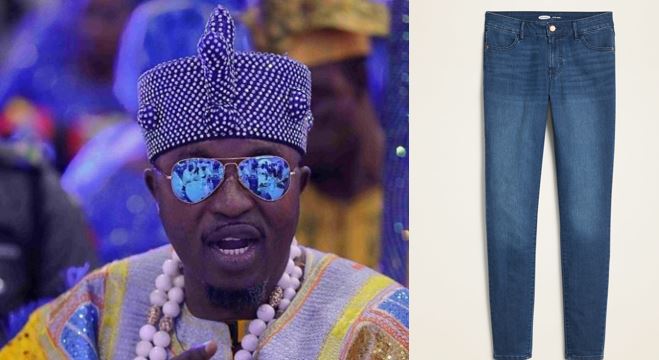The Oluwo of Iwoland, HIM Oba Abdulrosheed Adewale Akanbi, has urged the federal government to consider outright ban of foreign jeans to promote local fabrics and boost Nigeria’s economy.
The monarch made the call in his palace today January 27. According to him, the ban on foreign jeans will help Nigerian youths focus on utilizing the unique fabrics in Nigeria to make jeans and other fashion pieces
“I want to task the federal government to outrightly ban importation of foreign jeans into Nigeria, promote local jeans made of Ofi to aid job opportunities and advantages”
“It is about using our own fabrics to make clothes of western dresses which our kids like. You must think like the children and the youths if you want to influence them in any way”
“We cannot compel our youths and teenagers to start wearing agbada made of Aso Oke or Aso Ofi. But now I have branded our Aso Oke as Telu Jeans and Telu Jeans is normal jeans trousers, shorts and jacket made of Aso Oke”
“Our traditional clothes and accessories such as Ofi and beads are demonstration of rich culture and luxuries of wealth. So enticing and admiring but because a people affiliated wearing Ofi and using some cultural accessories as paganism, our children begin to run away from it”
“You only see a Yoruba child wearing Ofi and using beads at either wedding or naming ceremony. You can’t see Alfa or Pastor wearing Ofi or using beads to Mosque or Church. Why?
“I will lead the struggle to clean our culture and promote cultural accessories. I will provide technical requirements to assist the government in actualization of the dream”
“Aso Oke will also be used to sew suits and all office, school and religious wears. This will increase the demand for this local fabric and create jobs for our people who are weavers. It will also promote our culture and we will spend less money on importation of foreign clothes.
“It is about using our own fabrics to make clothes of the western world which our kids like. You must think like the children and the youths if you want to influence them in any way”.
“As traditional rulers, we have the role of clearly differentiating between the rich Yoruba culture and religion. The infiltration is scaring to our children. The culture has been lumped with traditional religion. It is disheartening. Our culture is clean. It has to be promoted and clearly he said distinguished to make it adorable and admirable to our generations”






















